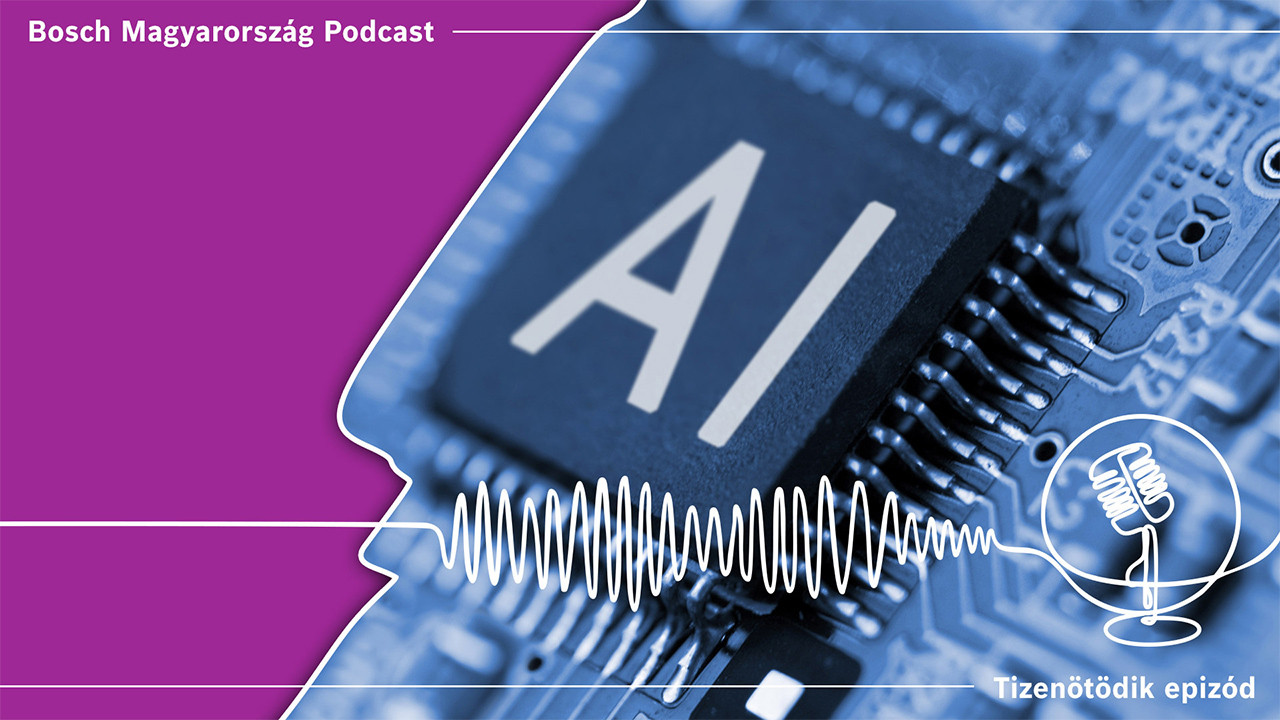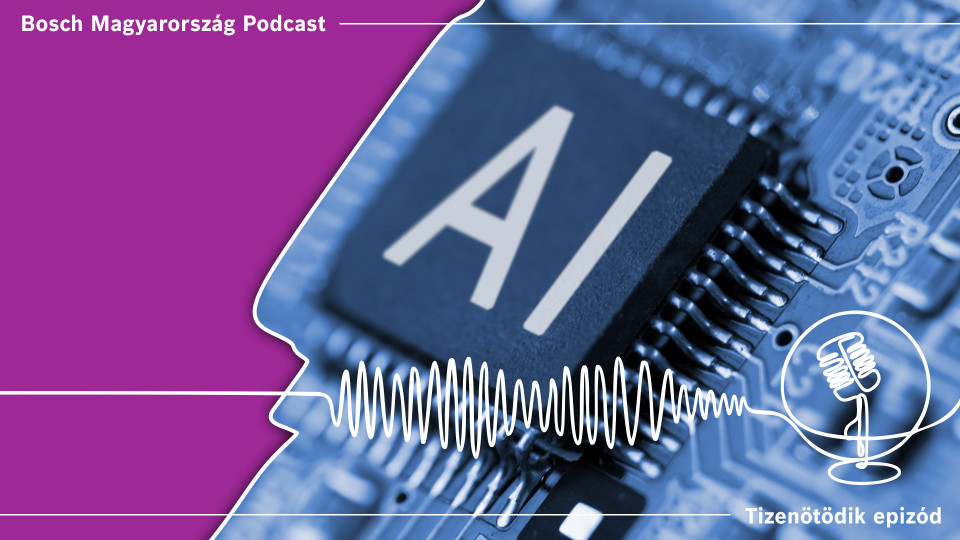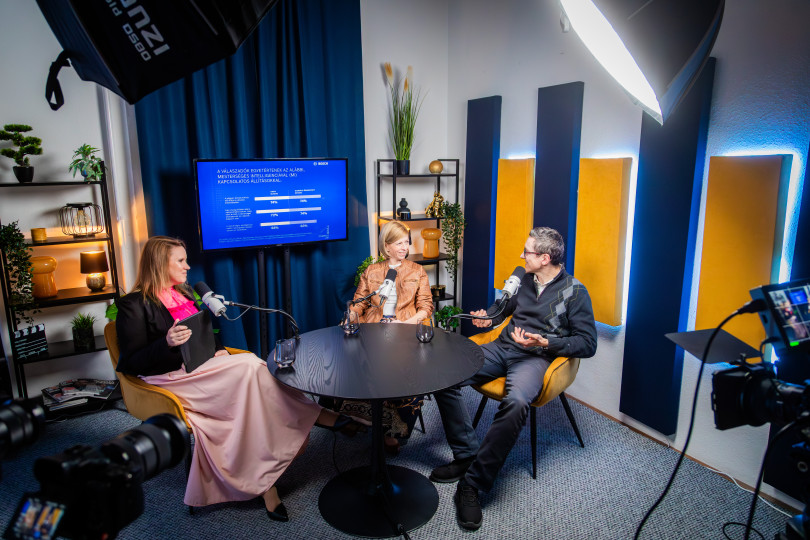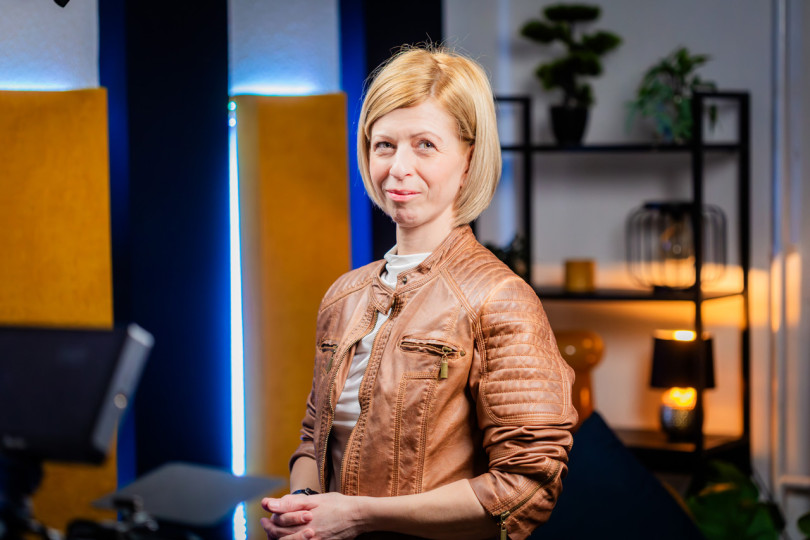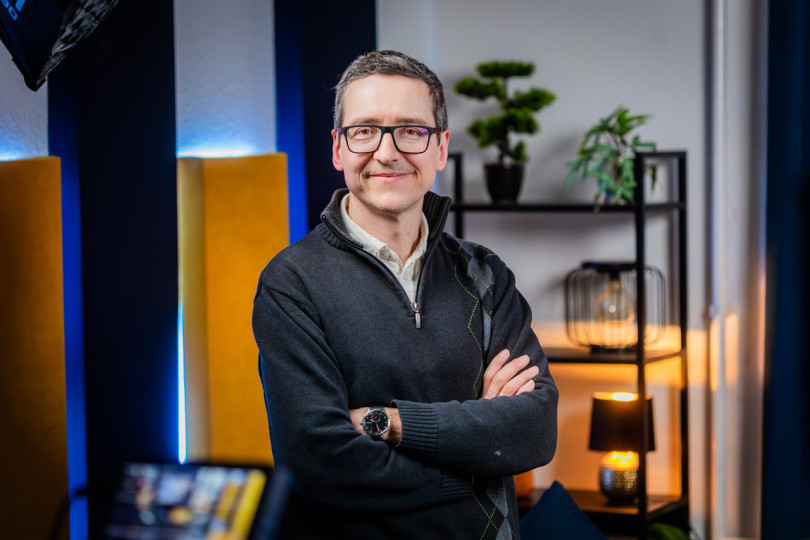Artificial intelligence (AI) is still in its infancy, but it is already clear that it will be the key technology of the coming years and the harbinger of a new industrial revolution. Is AI the greatest opportunity or the greatest challenge of our lives? Will it really take our jobs or save us? In the latest episode of the Bosch Hungary Podcast, experts discussed whether Hungarian society is prepared for the AI era.
The explosive growth of artificial intelligence is already having a major impact on our daily lives and workplaces. The latest episode of the Bosch Hungary Podcast discussed positive and negative effects, Hungarians' attitudes toward technology, and the role of companies and education in shaping the future. The guests were Róbert Pintér, PhD, sociologist and political scientist, lecturer at the Department of Infocommunications at Corvinus University and professional leader at Digiméter, a research institute specializing in corporate digitalization, as well as Mónika Hack, media relations manager at the Bosch Group in Hungary, and Edit Tóth, digital media manager of the Bosch Group in Hungary.
We have problems with definitions
Artificial intelligence is a general-purpose technology, like the steam engine or electricity, in that it can be used to solve a wide range of problems and can be applied in many areas of our lives. Moreover, due to its extremely rapid development, a quarter of Hungarians are unable to keep up with it, according to the Bosch Tech Compass international survey. However, mistrust of the technology has deeper roots. „We have problems defining the use of AI. We are not even aware that many applications are AI-based, or we simply do not consider them to be,” said Róbert Pintér, PhD, sociologist and political scientist. These applications include car navigation, traffic-based public transport recommendations, and optimized route planning, but also social media use, translation programs, and weather forecast apps.
We fear the unknown, yet we have no experience of it
Although 53% of Hungarians believe that artificial intelligence will be the defining technology of the next decade, according to Bosch Tech Compass research, its daily use is still negligible: for example, only one in twenty people use ChatGPT regularly. The survey also reveals that although few have tried it, half of those surveyed fear that AI will threaten or take away their jobs in the future. In order for the process of acceptance and trust-building to begin, we need to follow a similar path to when the internet was introduced, according to sociologist Róbert Pintér, who believes that iWiW (International Who is Who, an early social networking site started in 2002) brought about this breakthrough in Hungary. However, there is currently a lack of entry-level applications that would help people understand the technology, while many are not open enough to gain first-hand experience.
Digital openness will be a competitive advantage
According to respondents of the Bosch Tech Compass, companies and education have a major role to play in the acceptance of AI, a view echoed by the sociologist. Mónika Hack, media relations manager at the Bosch Group in Hungary, said that „Bosch has had an artificial intelligence codex since 2020, because, in line with the latest international innovative trends, artificial intelligence is found in all of the company’s products or contributes to their manufacture. In addition, continuous knowledge development is a corporate value: not only the training of employees, but also that of suppliers and future generations.”
However, it is not only companies but also employees who are responsible for remaining competitive through continuous training. When asked whether this will cause inequality in terms of how quickly people can keep pace with change, the sociologist said that in the medium term (within 5-15 years), the vast majority of professions will be restructured, and technological openness will become an advantage in the industrial segment: „It will not necessarily be the length of time spent at a company, experience or workplace knowledge that will play a role in determining career paths, but rather digital openness. So ultimately, it is not AI that will take away jobs, but another person who is better at using it.”
Critical thinking is also needed
„The use of AI poses a huge challenge for education,” said Róbert Pintér, „and the way we assess learning will have to be completely transformed in the future. In order to create solutions as quickly, efficiently, and effectively as possible, and to use the available tools in an ethical and legal manner, the correct application of AI must be taught in schools.”
The discussion also revealed that source verification will be essential for the workplace and everyday use of artificial intelligence. In addition to the government, legislators, professional bodies, and education, individuals and companies also have a major responsibility in developing cybersecurity awareness and critical thinking, and thus in recognizing fake news and counterfeits. „People need support in this area too,” emphasized Mónika Hack. „In order to use the latest technological developments safely, they need to be educated. At Bosch, for example, we promote general understanding through brand-independent professional content, blogs and podcast discussions. Our employees can take part in targeted training courses and workshops on the subject, and we place a high priority on knowledge sharing within the company.”
Bosch Hungary Podcast: technology in plain language
The Bosch Hungary Podcast deals with the most current issues in innovation and R&D, seeks to provide clear answers to the most pressing questions about the technology of the future with the help of expert guests. If you would like to learn more about current issues in artificial intelligence, you can listen to the answers and even watch them on Bosch Hungary’s podcast channels on YouTube, Spotify, Apple Podcasts, and Simplecast!
Zita Hella Varga
Phone: +36 70 667-6374
Bosch has been present in Hungary since 1898 with its products. After its re-establishment as a regional trading company in 1991, Bosch has grown into one of Hungary’s largest foreign industrial employers with currently eight subsidiaries. In fiscal 2023 it had total net sales of 2.207 billion forints and consolidated sales to third parties on the Hungarian market of 343 billion forints. The Bosch Group in Hungary employs more than 18,300 associates (as of December 31, 2023). Figures of fiscal 2024 of the Bosch Group in Hungary will be published on May 29, 2025. In addition to its manufacturing, commercial and development business, Bosch has a network of sales and service operations that covers the entire country.
The Bosch Group is a leading global supplier of technology and services. It employs roughly 418,000 associates worldwide (as of December 31, 2024). The company generated sales of 90.3 billion euros in 2024. Its operations are divided into four business sectors: Mobility, Industrial Technology, Consumer Goods, and Energy and Building Technology. With its business activities, the company aims to use technology to help shape universal trends such as automation, electrification, digitalization, connectivity, and an orientation to sustainability. In this context, Bosch’s broad diversification across regions and industries strengthens its innovativeness and robustness. Bosch uses its proven expertise in sensor technology, software, and services to offer customers cross-domain solutions from a single source. It also applies its expertise in connectivity and artificial intelligence in order to develop and manufacture user-friendly, sustainable products. With technology that is “Invented for life,” Bosch wants to help improve quality of life and conserve natural resources. The Bosch Group comprises Robert Bosch GmbH and its roughly 490 subsidiary and regional companies in over 60 countries. Including sales and service partners, Bosch’s global manufacturing, engineering, and sales network covers nearly every country in the world. Bosch’s innovative strength is key to the company’s further development. At 136 locations across the globe, Bosch employs some 87,000 associates in research and development.
Additional information is available online at www.bosch.hu, iot.boschblog.hu, www.bosch.com, www.iot.bosch.com, www.bosch-press.com, www.twitter.com/BoschPresse

